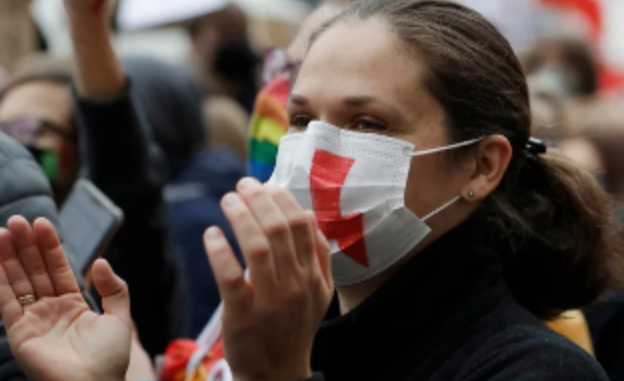
Abortion rights protesters from across Polandare set to descend on the capital of Warsawfor their biggest demonstrations yet since the top court’s near-total ban on abortion.
The demonstrations which have shaken the predominantly Catholic country in the last week have caused the European Union nation’s president to partially row back on plans to introduce even more restrictive rules around abortion.
Poland, which already had one of the most restrictive abortion laws in Europe, erupted into fury in the wake of a ruling by the Constitutional Tribunal last Thursday that amounts to an almost total ban on abortion.
While having a pregnancy terminated in Poland is illegal except in cases of rape, incest, when a female’s life is at risk, or if there is a severe foetal abnormality, the court has now ruled abortions, even in cases of foetal defects, are illegal.
But the Polish PM has now said he will propose legislation reintroducing the possibility of terminating a pregnancy due to foetal abnormalities – although only limited to “lethal” defects – in an attempt to quash mass protests as tens of thousands are set to demonstrate on Friday evening again.
Tens of thousands have flooded onto the streets to demonstrate against the ruling in the past week – marching through cities and disrupting church services in the predominantly Catholic country.
Hillary Margolis, a women’s rights researcher for Human Rights Watch, told The Independent: “The mass outpouring of support for peaceful protests across Poland and around the world only goes to show what an affront this decision is to basic rights and dignity.
“It is a fierce attack on women and girls borne out of longstanding efforts to undercut human rights, the rule of law, and the independence of courts in Poland. Even as ruling party leaders issue veiled threats, deploy military police and embolden nationalist groups to confront peaceful protesters, Poles from all walks of life are coming to the streets to say, ‘no more’.
“Using the Covid-19 pandemic as a pretext to punish peaceful protesters only shows how far some will go in attempts to clamp down on civil society when it doesn’t abide the ruling party’s views. If authorities are truly concerned about protesters’ well-being, they should ensure their safety and reverse course on a move that will grossly undermine the health of women and girls.”
A Polish abortion rights support group said it had seen a sharp rise in calls to its helpline since activists started spraying its number on buildings, statues and signs during protests.
“The number of our helpline has appeared on public television … on sidewalks, walls, even on churches,” Justyna Wydrzynska from the support group Abortions Without Borders told Reuters.
Ms Wydrzynska said some of the calls were from women seeking abortions who said they had been turned away by hospitals despite the fact the ruling is not yet enforceable.
The group got around 400 calls a month before the protests but in the days after the protest, it received almost 600 phone calls and more than 1 million zlotys (£199,317) in donations, she added.
Amnesty International warned peaceful protesters have been subjected to excessive use of force by police officers – as well as being “arbitrarily detained” without being allowed to have access to lawyers.
Draginja Nadazdin, director of Amnesty International Poland, said: “The massive wave of support for women in Poland is a sign that the government and the authorities cannot simply continue to violate women’s rights without opposition.
“Women in Poland are living under one of the strictest regimes in Europe in terms of access to abortion. Their right to protest against these restrictions must be upheld. The police must facilitate those wishing to protest peacefully in support of women, including by safeguarding protesters against harassment and violent attacks by counter-demonstrators.”
Five women have been charged with organising an illegal protest in the town of Police, where some 850 people gathered on Thursday, regional police spokeswoman Alicja Sledziona said on Friday.
There has been an unprecedented outpouring of anger against the ultra-conservative ruling nationalist Law and Justice (PiS) party – with protesters blaming the party and the Roman Catholic Church for the ruling. One opinion poll has shown a steep fall in support for PiS.
PiS, which came to power five years ago on a promise to instil more traditional values, is founded on a socially conservative, Catholic ideology and has waged a war on female reproductive rights.
*story by The Independent